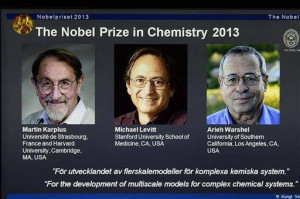The Nobel prize in chemistry for the year 2013 was awarded jointly to Martin Karplus (Harvard University) , Michael Levitt (Stanford School of Medicine) and Arieh Warshel (University of Southern California) for “the development of multi-scale models for complex chemical systems”.
 The fact that scientists these days can use computers to carry out experiments has yielded a much deeper understanding of how chemical processes play out. Computer models mirroring real life have become crucial for most advances made in chemistry today. Chemists earlier used to create models of molecules using plastic balls and sticks. Today, the modelling is carried out in computers.
The fact that scientists these days can use computers to carry out experiments has yielded a much deeper understanding of how chemical processes play out. Computer models mirroring real life have become crucial for most advances made in chemistry today. Chemists earlier used to create models of molecules using plastic balls and sticks. Today, the modelling is carried out in computers.
Wayback in the 1970s, Martin Karplus, Michael Levitt and Arieh Warshel laid the foundation for the powerful programs that are used to understand and predict chemical processes.
The strength of the methods the trio have developed is that they are universal. They can be used to study all kinds of chemistry – from the basic molecules of life to the complex industrial chemical processes enabling scientists to optimize solar cells, catalysts in motor vehicles and even drugs, to name a few.
Their methods have been devised basing on both classical and quantum physics. For example, in simulations of how a drug couples (DRUG interaction) to its target protein in the body, the software performs quantum theoretical calculations on those atoms in the target protein that are interacting with the drug. The remainder of the large protein is simulated using less demanding classical physics . In the present day computer has become a tool as important the test tube for a chemist. The Simulations are so perfect that they mimick the outcome of traditional experiments.
The Royal Swedish Academy of Sciences (RSAS) said “It is a tantalizing thought. The computer models that have been developed by the three Nobel laureates are powerful tools. Exactly how far they can advance our knowledge is for the future to decide”.

